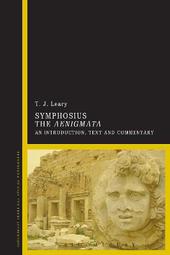
|
Symphosius The Aenigmata: An Introduction, Text and Commentary
Paperback / softback
Main Details
| Title |
Symphosius The Aenigmata: An Introduction, Text and Commentary
|
| Authors and Contributors |
By (author) T. J. Leary
|
| Physical Properties |
| Format:Paperback / softback | | Pages:280 | | Dimensions(mm): Height 234,Width 156 |
|
| Category/Genre | Literary studies - classical, early and medieval |
|---|
| ISBN/Barcode |
9781474257640
|
| Classifications | Dewey:878 |
|---|
| Audience | | Professional & Vocational | |
|---|
| Illustrations |
3 illus
|
|
Publishing Details |
| Publisher |
Bloomsbury Publishing PLC
|
| Imprint |
Bloomsbury Academic
|
| Publication Date |
24 September 2015 |
| Publication Country |
United Kingdom
|
Description
The post-classical compilation known to modern scholarship as the Latin Anthology contains a collection of a hundred riddles, each consisting of three hexameters and preceded by a lemma. It would seem from the preface to this collection that they were composed extempore at a dinner to celebrate the Roman Saturnalia. The work was to have a defining influence on later collections of riddles; yet its title (probably the Aenigmata) has been debated, and almost nothing is known about its author: questions have even been asked about his name (Symphosius?) and date (4th-5th centuruy AD?). In this edition of the riddles, the Introducion discusses the work's title and its author's identity: as well as his name and date, it considers his national origin (North African?) and intellectual background (a professional grammarian?), and argues that he was not Christian, as has been suggested. It examines the Saturnalian background to the work, setting it in its sociological context, and discusses the author's literary debts - especially to Martial. The Introduction also explores the author's ordering and arrangement of the riddles, discusses his literary style, Latinity and metre, and comments briefly on his Nachleben. It concludes with a survey of the textual tradition. The commentary on each riddle includes a translation, general notes on the object it describes (with reference, as necessary, to museums and artefacts), and discussion of how it fits into the ordering of the collection, of variant readings and, with suitable illustration, of literary, stylistic and metrical considerations. Other areas, such as history and mythology, are also covered where relevant.
Author Biography
T.J. Leary is editor of Martial Book XIII: The Xenia and Martial Book XIV: The Apophoreta, both published by Bloomsbury.
ReviewsLeary's notes bring out much fascinating information about everyday Roman existence and belief as he explains the assumptions contained in these apparently simple verses. ... With full philological attention to the transmission of the text and extensive notes on the language of each riddle, this is an exemplary library edition. The level of language competence demanded for the text itself means that these verses are quite accessible for a general reader; teachers looking for suitable material for a class to begin reading authentic texts could well look to this edition as a useful resource. * Classics for All Reviews *
|